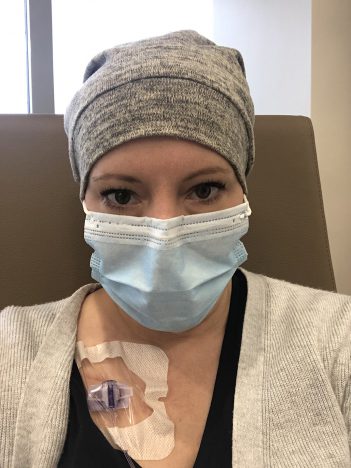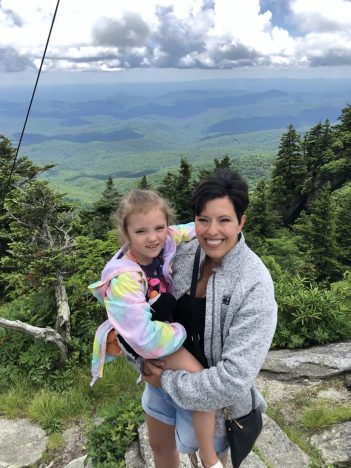When Fishers resident Karen Witte sought medical advice about the possibility of a breast cancer diagnosis after a self-exam caused some concerns, her doctor told her she had nothing to worry about. Witte was only 41.
However, after two mammograms and some biopsies, doctors confirmed that Witte had hormone-positive breast cancer. She was diagnosed in March 2020 on the dawn of the COVID-19 pandemic.
“It was a whirlwind,” Witte said.
Witte not only had to cope with a cancer diagnosis, she also had to make a very difficult decision.
“Hormone-driven breast cancer is one of the more common kinds, and when you’re younger and diagnosed with hormone-driven breast cancer, they put you on an estrogen blocker for 10 years. That forces you into chemical menopause until you reach normal menopause range,” Witte said. “What that leaves with younger women is deciding to not have any more kids or go through egg retrieval and freeze their eggs.”
Witte didn’t opt for egg retrieval. She has a 5-year-old daughter named Cameron.
“I was 41, so even though I chose not to have any more kids, still being told you cannot have any more kids is a punch in the gut,” she said. “It makes the diagnosis sting a little more.”
Since her diagnosis, Witte has gone through chemotherapy, radiation and five surgeries, including a unilateral mastectomy. She still has one surgery left to finish her reconstruction.
“Some women opt to, we call it, ‘stay flat,’ and I can understand that, because with the trauma alone of going through cancer treatments, you decide you’re done,” Witte said. “But me, with my age, I felt like I wanted to try to look and feel like my old self, or as normal as can be after the cancer.”

Witte also had to cope with attending all her appointments and treatments alone last year. Hospitals didn’t allow visitors because of the threat of spreading COVID-19.
“Definitely going through all of the appointments, and especially the initial diagnosis, alone was difficult,” Witte said. “I was allowed to have my best friend on speaker phone (during my diagnosis), and she’s actually a thyroid cancer survivor, so she was my go-to on everything cancer-related. So, I was able to have her on speaker phone for some of the initial appointments. I did see people coming to the hospital with their spouse or support person with them and being told, ‘I’m sorry, they can’t come in.’ It broke my heart for them.”
Witte credits her friends, employer and co-workers for helping her get through her cancer treatments. She works as a communications analyst at MISO Energy in Carmel. She said her friends would take turns driving her to and from appointments and waiting in their car while she received treatment. Witte said her employer was flexible during that time.
“I have an amazing team. Both my manager and my director are female, and I don’t know if that made a difference, but I feel like it did,” she said. “They had the compassion and empathy and flexibility to let me rest if I needed to rest or take time off for appointments.”
Witte’s supervisor, Julie Munsell, the director of strategic communications for MISO, said it’s important for employers to support employees when going through a life-changing event, such as a cancer diagnosis. Munsell lives in Little Rock, Ark., where another MISO office is.
“Employers should take an employee experience view of supporting employees who are going through these challenges. That means going beyond the step of explaining what their benefits plans offer and taking the time to really understand their needs,” Munsell said. “There are a lot of ways you can support an employee outside of the company’s standard benefits plans. What I have done is sit down with the employee and ask them to share what their needs are and how I can be helpful in their treatment and recovery process.
“It’s important to have flexibility in your planning process so you can adjust to changes that may occur during their recovery.”
Munsell said the team brought in a contractor to provide support and manage the workload while Witte received treatment.
“I also want the employee to always feel empowered to make decisions that prioritize their health first and foremost,” Munsell said. “Try to find work projects suited to their ability to contribute while undergoing treatment. Employees with whom I’ve worked who were undergoing treatment shared that their professional work gave them a powerful sense of purpose when their health outcomes remained uncertain. Don’t make assumptions about what someone is going through, even if you think you are being helpful. Everyone is different, and their experience may be unique from other patients.
“Reassure them that your goal is to support them through their recovery process, not to work around them.”
Witte also was going through the Hamilton County Leadership Academy at the time. The academy shifted to a virtual format, and Witte completed it.
Although Witte is finished with her chemotherapy and radiation, she calls cancer a “lifelong diagnosis.” She still returns to the hospital because of pain and other side effects from the medications. She also said the thought of recurrence is always at the back of cancer survivors’ minds.
In her spare time, Witte likes to listen to live music and travel.
Giving back
Breast cancer survivor and Fishers resident Karen Witte will participate for the first time in the Oct. 16 Susan G. Komen MORE THAN PINK walk Indianapolis.
Witte also has been instrumental in bringing speakers into her work to educate her co-workers on the signs and symptoms of breast cancer.
“I connected with an organization out of New York called The Pink Agenda, and they do Webex seminars that are a really great resource for people looking to learn more about the signs and symptoms of breast cancer,” she said. “You can request a speaker to come and speak for free.”
A speaker will speak to MISO Energy, Witte’s employer, later this month for Breast Cancer Awareness Month. It will be the second time The Pink Agenda has presented to the organization.
For more about the MORE THAN PINK walk, visit bit.ly/3oFQhlB





